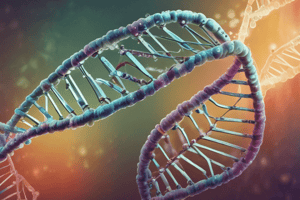Podcast
Questions and Answers
What does the DNA molecule look like?
What does the DNA molecule look like?
a twisted ladder
How do you think a DNA molecule makes a copy of itself?
How do you think a DNA molecule makes a copy of itself?
it splits and untwists
What are the two DNA components shown in the Gizmo?
What are the two DNA components shown in the Gizmo?
nucleoside and phosphate
How many different nitrogenous bases do you see?
How many different nitrogenous bases do you see?
What makes up the sides of the DNA molecule?
What makes up the sides of the DNA molecule?
What makes up the rungs of the DNA molecule?
What makes up the rungs of the DNA molecule?
Adenine joins to?
Adenine joins to?
Cytosine joins to?
Cytosine joins to?
Thymine joins to?
Thymine joins to?
Guanine joins to?
Guanine joins to?
What does the enzyme DNA helicase do to the DNA molecule?
What does the enzyme DNA helicase do to the DNA molecule?
What are the three parts of a nucleotide?
What are the three parts of a nucleotide?
Why is DNA replication such an important process?
Why is DNA replication such an important process?
What is chromatin?
What is chromatin?
Flashcards
What does DNA look like?
What does DNA look like?
DNA resembles a twisted ladder.
How does DNA replicate?
How does DNA replicate?
DNA replication involves splitting and untwisting the DNA molecule.
What are the two main parts of a DNA molecule?
What are the two main parts of a DNA molecule?
The two main components of a DNA molecule are nucleosides and phosphates.
How many nitrogenous bases are in DNA?
How many nitrogenous bases are in DNA?
Signup and view all the flashcards
What makes up the sides of the DNA molecule?
What makes up the sides of the DNA molecule?
Signup and view all the flashcards
What makes up the rungs of the DNA molecule?
What makes up the rungs of the DNA molecule?
Signup and view all the flashcards
What does Adenine pair with?
What does Adenine pair with?
Signup and view all the flashcards
What does Cytosine pair with?
What does Cytosine pair with?
Signup and view all the flashcards
What does Thymine pair with?
What does Thymine pair with?
Signup and view all the flashcards
What does Guanine pair with?
What does Guanine pair with?
Signup and view all the flashcards
What does the enzyme DNA helicase do?
What does the enzyme DNA helicase do?
Signup and view all the flashcards
What are the parts of a nucleotide?
What are the parts of a nucleotide?
Signup and view all the flashcards
Why is DNA replication important?
Why is DNA replication important?
Signup and view all the flashcards
Study Notes
DNA Structure and Function
- DNA resembles a twisted ladder, also referred to as a double helix.
- During replication, DNA molecules split and untwist to form two identical strands.
- Key components of DNA include nucleosides and phosphates.
Nitrogenous Bases
- There are four nitrogenous bases in DNA: Adenine (A), Cytosine (C), Guanine (G), and Thymine (T).
- The sides of the DNA ladder are composed of phosphates and sugar.
- The rungs of the ladder are formed by pairs of nitrogenous bases.
Base Pairing Rules
- Adenine (A) pairs with Thymine (T).
- Cytosine (C) pairs with Guanine (G).
- This base pairing is crucial for accurate DNA replication.
Enzymatic Process in DNA Replication
- DNA helicase is an enzyme that splits DNA into two strands during replication.
- A nucleotide consists of three components: phosphate, sugar, and a nitrogenous base.
Importance of DNA Replication
- DNA replication is essential for cell growth and division.
- Without replication, cells would be unable to grow or reproduce.
Additional Terminology
- Chromatin is a complex of DNA and protein found in the nucleus of eukaryotic cells, which condenses to form chromosomes during cell division.
Studying That Suits You
Use AI to generate personalized quizzes and flashcards to suit your learning preferences.




